To keep your Endless Pool water crystal clear, regularly test and balance your water chemistry, including pH and sanitizer levels. Maintain your filtration system by cleaning filters and ensuring proper circulation daily. Shock the pool periodically to eliminate contaminants and debris. Clean the pool surfaces and filter often, and always use chemicals safely following instructions. Keep an eye on water levels and establish a consistent maintenance routine to prevent issues—then discover more tips to perfect your pool’s clarity.
Key Takeaways
- Regularly test and adjust pH, alkalinity, and sanitizer levels to maintain water balance and prevent cloudiness.
- Clean and backwash filters weekly, and ensure proper circulation to optimize water clarity.
- Skim surface daily and brush walls weekly to remove debris and prevent algae buildup.
- Shock the pool as needed, especially after heavy use, and run the pump continuously post-treatment.
- Establish a routine maintenance schedule and keep detailed logs to stay on top of water quality and clarity.
Regularly Test and Balance Water Chemistry
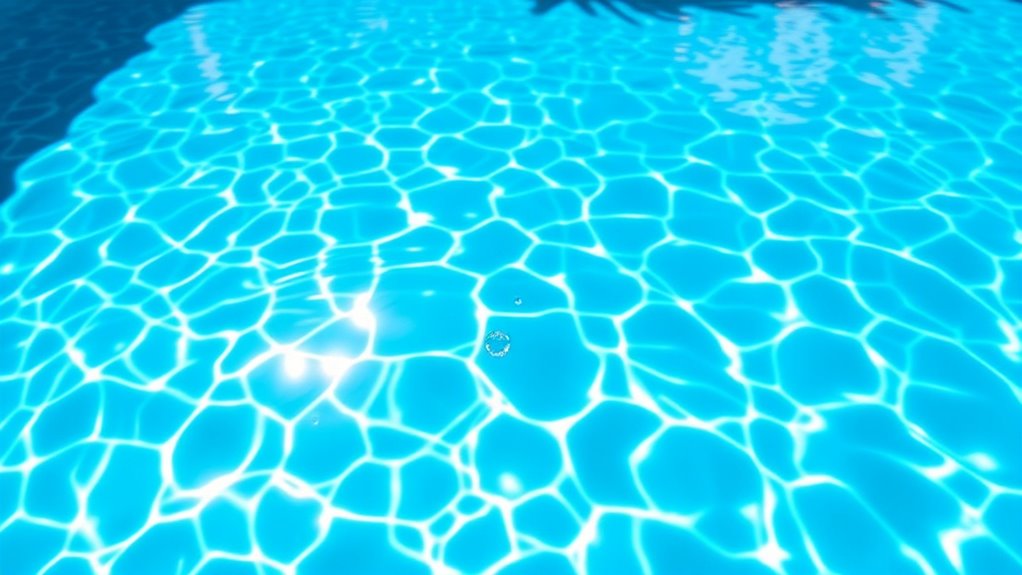
Regularly testing and balancing your pool water chemistry is essential to keep your water safe and inviting. By checking your water’s pH, alkalinity, and sanitizer levels weekly, you ensure the water stays comfortable and free of harmful bacteria. Use reliable test strips or a liquid test kit for accurate readings. If your pH is too high or low, adjust it with pH increasers or decreasers as needed. Maintain proper alkalinity to buffer pH swings, and keep sanitizer levels balanced to prevent algae growth and bacteria. Don’t guess—accurate testing helps you catch problems early, saving you time and money on costly repairs later. Regular maintenance keeps your pool sparkling clean and safe for every swim. Incorporating water chemistry testing into your routine helps prevent issues before they become costly problems.
Maintain Proper Filtration and Circulation
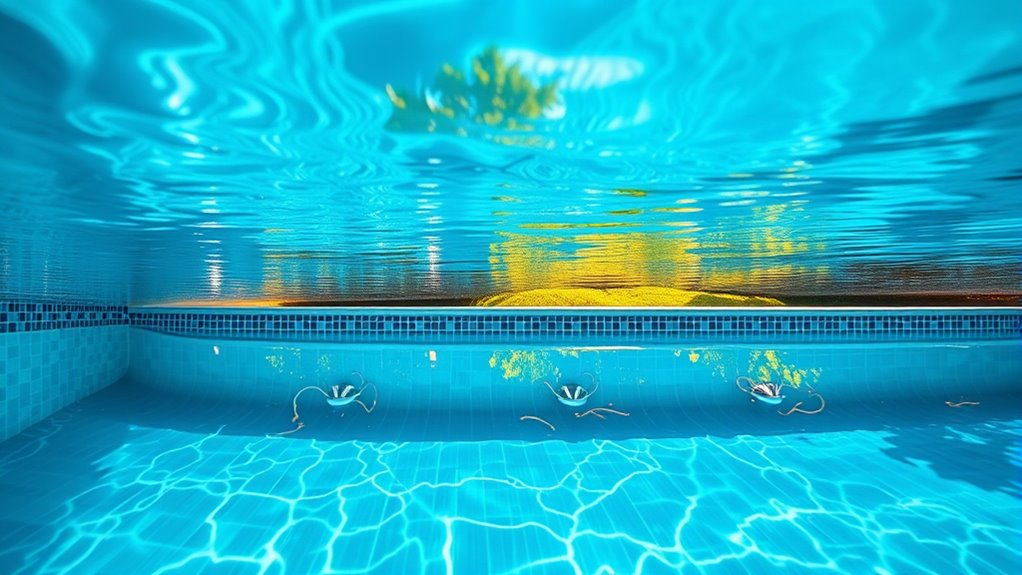
You need to regularly check your filter to guarantee it’s working efficiently. Optimizing your pump flow helps keep water moving and prevents stagnation. Be sure to identify and fix any dead zones where circulation isn’t reaching, so your pool stays clean and clear. Incorporating a whole-house filtration system can further improve water quality by removing contaminants throughout your pool’s plumbing.
Regular Filter Checks
To make certain your pool stays clean and clear, it’s essential to check the filter system regularly. A clean filter ensures proper water flow and removes debris effectively. Start by inspecting the filter for visible dirt or blockages and clean or replace it as needed. Regular checks prevent costly repairs and maintain water quality. Use the table below to understand filter maintenance steps:
| Step | Action | Frequency |
|---|---|---|
| Visual Inspection | Look for debris or damage | Weekly |
| Cleaning | Rinse filter with hose | Every 2-4 weeks |
| Replacement | Change filter cartridge | Every 6-12 months |
| Backwashing | Reverse flow to clean media | Monthly |
| System Check | Ensure proper operation | Monthly |
Maintaining proper filtration and circulation is vital for keeping your water clear and healthy.
Optimize Pump Flow
A properly functioning pump is key to maintaining clean, healthy pool water. To optimize pump flow, guarantee your pump’s speed and flow rate match your pool’s size and needs. Regularly check for debris or blockages in the skimmer and pump baskets, and clean them as needed to prevent restrictions. Adjust the pump’s flow to promote even circulation without overworking the system. If your pump has multiple speed settings, select the appropriate one—usually a lower setting for regular circulation and higher for vigorous cleaning. Keep an eye on pressure gauges; if pressure rises above the recommended range, it indicates a need for maintenance or flow adjustment. Proper pump flow helps distribute chemicals evenly, prevents stagnation, and keeps your water crystal clear. Additionally, implementing energy-efficient commercial grade heat pumps can further optimize your pool’s climate control while reducing operational costs.
Prevent Circulation Dead Zones
How can you guarantee your pool water stays evenly filtered and free of stagnation? The key is preventing circulation dead zones. These are areas where water moves slowly or not at all, allowing debris and bacteria to settle. To avoid this, position your pump and return jets strategically, ensuring water flows throughout the entire pool. Regularly inspect and adjust jet angles to promote better circulation. Consider adding additional return fittings if needed. Keep your pump running long enough each day to circulate all water effectively. Cleaning filters and skimming debris also help maintain smooth flow. Using appropriate filtration systems can further enhance water clarity and hygiene. By actively managing circulation patterns, you ensure your pool stays crystal clear, healthy, and free of stagnation, making your swimming experience more enjoyable and hygienic.
Shock Your Pool to Eliminate Contaminants
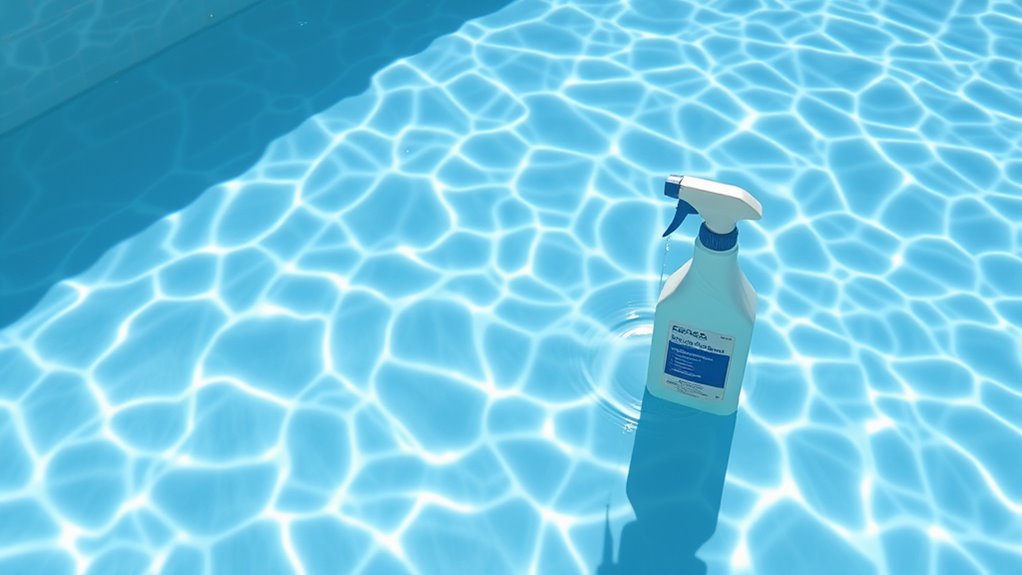
To keep your pool clean and safe, you need to shock it properly to eliminate contaminants. Knowing the right methods, timing, and how often to shock helps guarantee your water stays clear and healthy. Additionally, understanding best practices for pool maintenance can prevent issues before they arise. Let’s explore how to effectively use these techniques for ideal results.
Proper Shock Treatment Methods
When contaminants like bacteria, algae, and organic debris accumulate in your pool, a proper shock treatment becomes essential to restore clarity and safety. To do this effectively, choose a high-quality chlorine shock or non-chlorine shock, depending on your pool’s needs. Before shocking, test your water and adjust the pH to around 7.2–7.6 for ideal results. Dissolve the shock in a bucket of water before adding it evenly across the pool surface, or follow the product’s instructions for direct application. Run your pump and filter continuously afterward to circulate the chemicals and help break down contaminants. Avoid swimming until your water clears and chlorine levels return to safe standards. Proper shock treatment keeps your pool sparkling clean and safe for swimming. Regular maintenance and monitoring are key to maintaining a crystal-clear pool.
Timing and Frequency
Maintaining the right timing and frequency for shock treatments guarantees your pool stays clean and safe. Regularly shocking your pool eliminates contaminants, bacteria, and algae before they become visible problems. Typically, you should shock your pool once a week or after heavy use, rain, or storms. Skipping treatments risks cloudy water and potential health hazards. Consistency is key—over-shocking can harm your pool equipment, while under-shocking allows contaminants to build up. Use this guide to stay on schedule:
| Usage Level | Shock Frequency | Emotions Evoked |
|---|---|---|
| Light use | Once every 2-3 weeks | Confidence in your pool’s purity |
| Moderate use | Weekly | Joy of crystal-clear water |
| Heavy use or storms | After each event | Peace of mind and safety |
Additionally, understanding your refrigeration system can help prevent temperature fluctuations that may affect chemical balance.
Clean the Pool and Filter Frequently
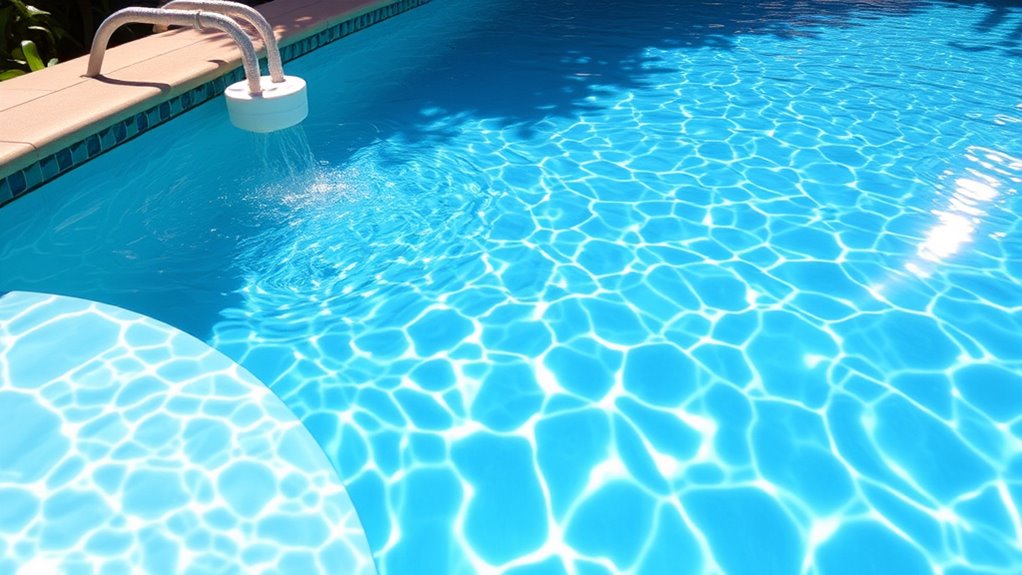
Regularly cleaning your pool and filter is essential to keep the water clear and safe. Debris like leaves, dirt, and bugs can quickly accumulate, making the water cloudy and potentially damaging your filter. Skim the surface daily and brush the walls weekly to remove algae and buildup. Clean the filter according to the manufacturer’s instructions—usually once a month—to prevent clogs and maintain ideal circulation. A clean filter ensures that chemicals distribute evenly and contaminants are removed efficiently. Don’t forget to backwash or rinse the filter regularly to keep it functioning properly. Consistent cleaning reduces the workload on your filtration system and prolongs its lifespan, helping you enjoy crystal-clear water with less effort. Additionally, consider using portable camping toilets for outdoor setups, which can reduce debris introduction into your pool area and make maintenance even easier.
Use the Right Pool Chemicals Safely and Effectively
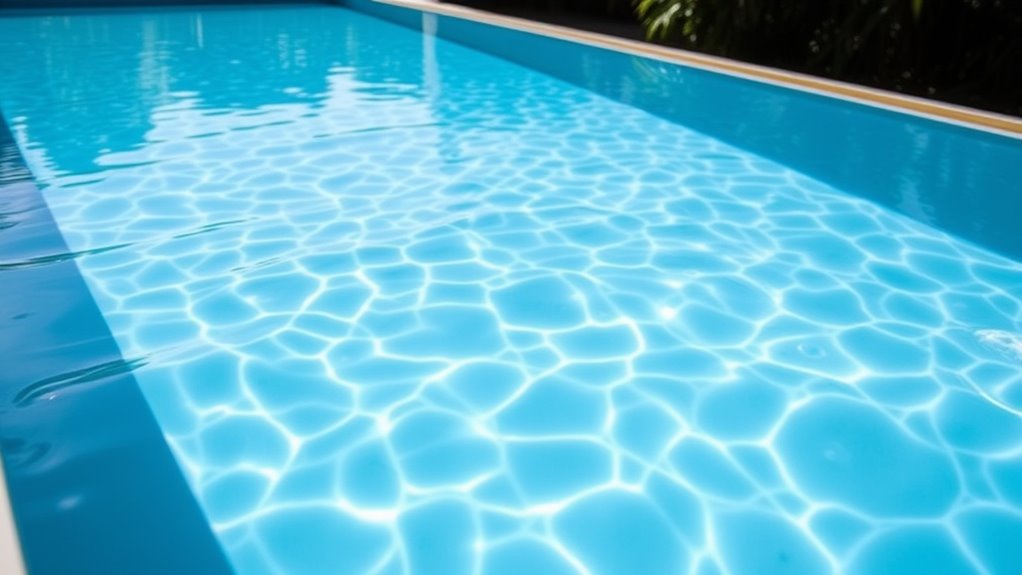
Using the right pool chemicals is essential for keeping your water safe and balanced. Proper chemical use prevents algae growth, bacteria, and cloudy water. Always follow manufacturer instructions, wear protective gear, and add chemicals gradually. Test your water regularly to determine what’s needed and avoid over- or under-treating. Use the following table to understand common chemicals and their purposes:
| Chemical | Purpose |
|---|---|
| Chlorine | Disinfects and sanitizes |
| pH Adjusters | Balance acidity and alkalinity |
| Algaecides | Prevent algae growth |
Handling chemicals carefully guarantees safety and effectiveness. Store them in a cool, dry place, away from children and pets. Consistent, correct application maintains clear, healthy water. Regularly reviewing your retirement savings plan can help ensure your financial future remains secure, just like proper chemical maintenance keeps your pool water pristine.
Monitor Water Levels and Add Water When Needed
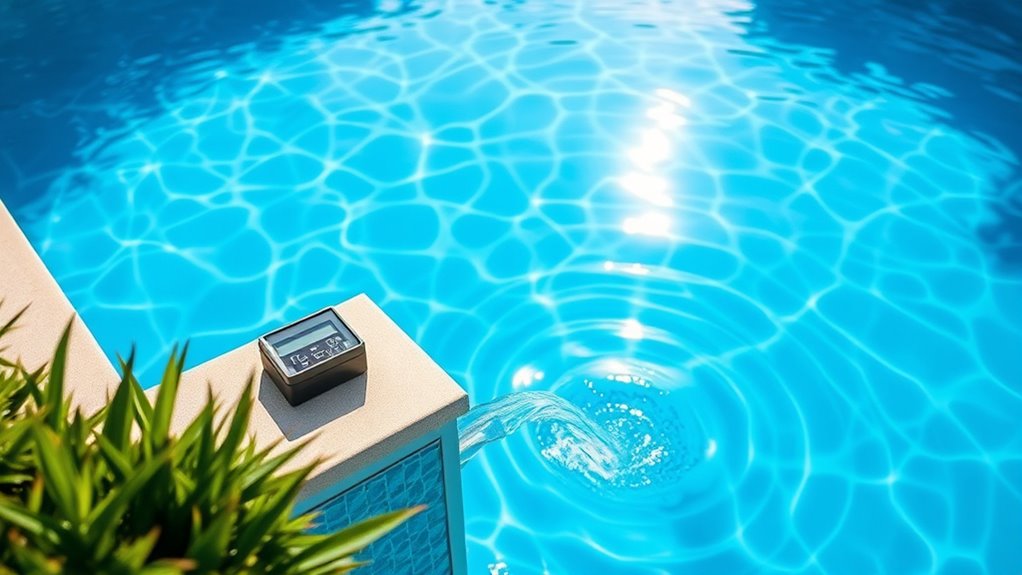
Monitoring your pool’s water levels is essential to keep the water balanced and prevent damage to your equipment. Regularly check the water level using the skimmer opening or a dipstick—ideally, it should be halfway up the skimmer opening or the proposed water line. If it’s too low, add water slowly to avoid overflow and ensure proper skimming and filtration. Use a garden hose with a filter or a submersible pump for controlled filling. Keep a close eye on water levels, especially during hot weather or after heavy use, as evaporation and splashing can lower water levels quickly. Maintaining proper water levels helps your pump operate efficiently and keeps your pool water crystal clear.
Establish Consistent Maintenance Routines
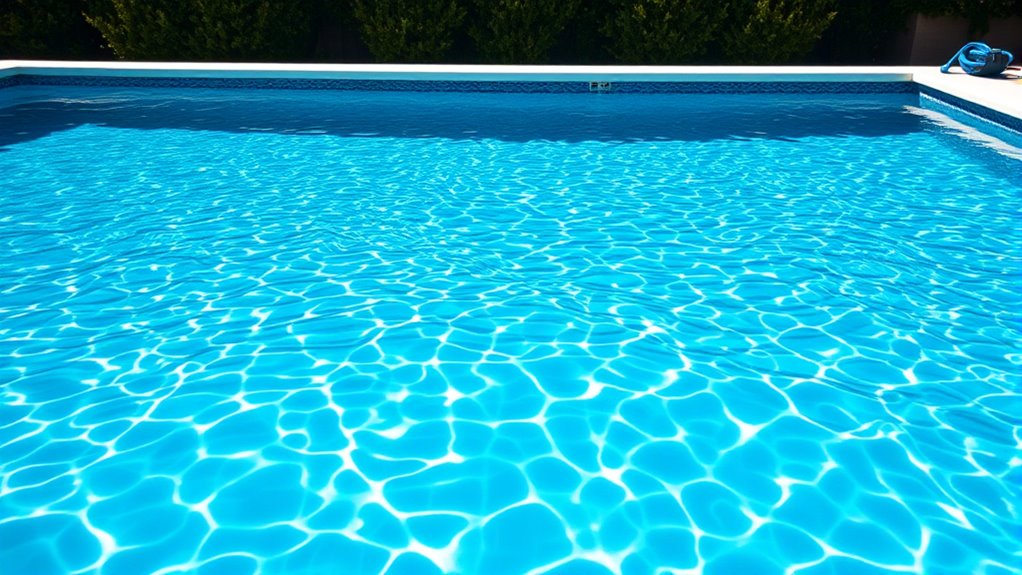
Keeping your pool in top shape requires more than occasional checks; establishing consistent maintenance routines guarantees your water stays balanced and your equipment functions properly. Create a weekly schedule to test water chemistry, including pH, chlorine, and alkalinity levels. Regularly clean the filter to prevent buildup that can hamper circulation and filtration. Skim the surface daily to remove leaves and debris, and vacuum the pool weekly to keep the bottom clean. Check and adjust water levels as needed to ensure proper skimming and circulation. Keep a log of maintenance tasks so you stay on track and identify patterns. Consistency minimizes algae growth, prevents equipment damage, and keeps your pool water crystal clear, saving you time and effort in the long run.
Frequently Asked Questions
How Often Should I Replace My Pool’s Water for Optimal Clarity?
You should consider replacing your pool’s water every 3 to 5 years for ideal clarity. Regular maintenance, like balancing chemicals and filtering daily, helps extend this period. If you notice cloudiness, foul odors, or algae growth sooner, it’s time for a water change. Keep an eye on water quality, and don’t hesitate to replace it sooner if necessary to maintain crystal-clear, inviting water.
Can Natural or Organic Treatments Help Maintain Clear Water?
Imagine your pool as a tranquil pond in a lush garden—natural treatments can help maintain its serenity. Organic options like beneficial enzymes and algae preventers work gently yet effectively, reducing the need for harsh chemicals. They help keep your water clear and inviting, promoting a healthier environment. Just remember, consistent maintenance and balancing are key to preserving that crystal clarity without disrupting the natural harmony of your pool’s ecosystem.
What Are the Signs of a Failing Filtration System?
You’ll notice your filtration system is failing if the water becomes cloudy, develops a foul odor, or shows visible debris and algae. You might also see reduced flow from the filter or hear unusual noises. If you’re constantly cleaning the pool or the water doesn’t stay clear despite efforts, it’s a sign to inspect and possibly replace or repair your filter. Regular maintenance helps prevent these issues.
Are There Eco-Friendly Chemicals That Keep Water Clear?
Yes, there are eco-friendly chemicals that keep your water clear. You can opt for mineral sanitizers, which naturally inhibit bacteria and algae without harsh chemicals. Enzyme-based cleaners break down organic matter, reducing the need for strong chemicals. And UV sterilizers use light to sanitize water without adding anything to it. These options help maintain crystal-clear water while being gentle on the environment, keeping your pool safe and eco-conscious.
How Does Weather Affect Pool Water Clarity and Maintenance?
Weather is like a mischievous artist, painting your pool water with unpredictable strokes. Rain can wash in dirt and debris, cloud your water, and introduce chemicals that throw off balance. Hot, sunny days accelerate algae growth, making maintenance a race against time. To keep clarity, regularly skim debris, adjust chemical levels, and run your filter longer after storms or heatwaves. Staying vigilant keeps your pool sparkling, no matter the weather’s whims.
Conclusion
By sticking to these simple steps, you’ll keep your endless pool crystal clear all season long. For example, imagine noticing cloudy water after a busy weekend—just a quick shock treatment and filter clean, and it’s sparkling again. Consistent testing, proper chemical use, and regular maintenance make all the difference. With a little effort, you’ll enjoy pristine water anytime you plunge in, turning your pool into a rejuvenating oasis you can be proud of.










